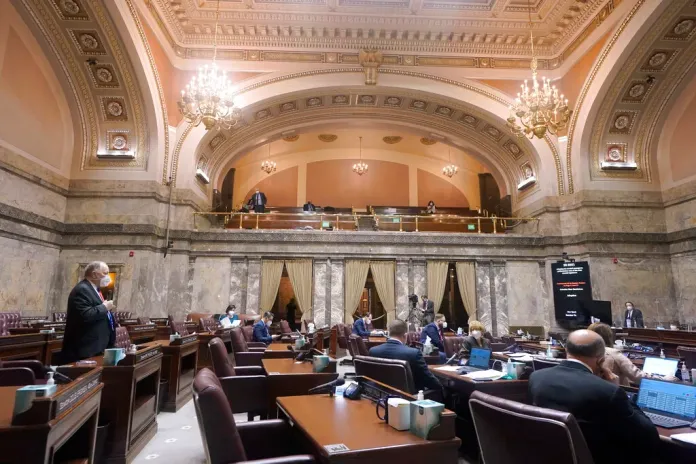(The Center Square) – Washington state’s public pension system is among the best funded in the nation, but concerns remain that long-term planning decisions could end up costing taxpayers in more ways than one. While some stakeholders have called attention to optimistic investment forecasting, others believe the state should actually reduce spending into various pension plans expected to be overfunded.
During this year’s legislative session, state lawmakers enacted Senate Bill 5357, raising the assumed rate of return on pension investments from 7% to 7.25%. The change allowed the Legislature to avoid putting millions of dollars into the system without affecting the unfunded liability.
However, Legislative Coordinator Emmett Mills with the Washington State School Retirees’ Association told The Center Square that “we think raising the assumed rate a matter of concern to all Washingtonians. Underinvesting could cost taxpayers billions of dollars while also putting retirement security … at risk.”
He noted that during the early 2000s, the Legislature stopped paying into the system and found itself stuck with a massive unfunded liability in the wake of the Great Recession.
“We’ve seen this all play out before,” he said.
He added that while “Our state investment board is excellent, probably the best in the business and that “the change the Legislature made was not a dramatic one, at the same time it was a step in the wrong direction. If things go really poorly, then it could be billions and billions of dollars. If the plans reached a point where they were in such a financially precious position and the legislature had no other choice, they would be able to potentially reduce the benefits.”
Complicating the situation are the contrasting fiscal conditions of the different plans in the system. Public Employees’ Retirement System (PERS) Plan 1 and Teachers’ Retirement System (TRS) Plan 1, which were closed in the 1970s, maintain an unfunded liability. However, other plans in the system are projected to be overfunded in the coming years. Association of Washington Cities Government Relations Director Candice Bock told the Pension Funding Council at its Wednesday meeting that it should be cautious about contribution rates by public employers.
“We’re in some pretty challenging budget times and our pensions are looking very good,” she said. “If we are funding them at a level where they’re effectively being overfunded at some point, as we see from other pension programs, we can’t really get that money back. It’s a sunk cost and it takes away from our ability to fund current operational ongoing means, services we have to provide to our residents. So, I think we want to be very cautious about being too aggressive with what’s going to drive our future rates and going put more money into these programs than is needed.”
At the same time, some lawmakers on the Pension Funding Council pushed back against a motion adopted by a majority of members to maintain the current long-term economic assumptions around issues such as inflation, rather than recommendations made by the Office of the State Actuary, which would have raised the assumed rate of inflation.
Sen. Chris Gildon, R-Puyallup, told colleagues that “if we underfund the pension, it’s going to cost us a lot more to catch up in the future years. I think we need to look at this with a long-term view in mind and not just with the short-term difficulties that it may provide by adopting the suggested rates.”
One legislative proposal to address pension system funding is Senate Bill 5085, introduced during the legislative session by Sen. June Robinson, D-Everett. The bill, which did not pass, would have consolidated TERS 1 and PERS 1 with Law Enforcement Officers’ and Firefighters’ Retirement System Plan 1.
THE CASE FOR TRUMP WINNING A NOBEL PEACE PRIZE
The bill was supported by WSSRA, with Mills arguing that the legislation “would essentially allow the state and local governments to stop making payments on pension debt. If the legislature wants to save money, there is a responsible way to do it.”
The Center Square reached out to Robinson regarding whether or not she intended to reintroduce the bill next session, but did not receive a response. Another bill introduced this session, House Bill 2034, would have transferred the $3 billion surplus in LEOFF 1 to the general fund; however, it did not clear the chamber.
, 2025-10-09 20:37:00,  , Washington Examiner, %%https://www.washingtonexaminer.com/wp-content/uploads/2023/11/cropped-favicon.png?w=32, https://www.washingtonexaminer.com/feed/, Center Square
, Washington Examiner, %%https://www.washingtonexaminer.com/wp-content/uploads/2023/11/cropped-favicon.png?w=32, https://www.washingtonexaminer.com/feed/, Center Square
